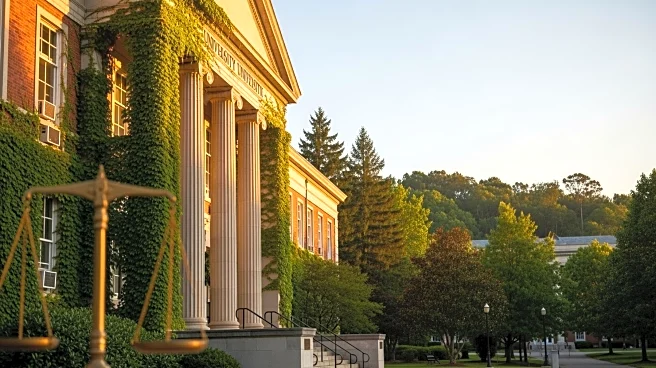What's Happening?
The Trump administration and the University of Virginia are close to finalizing a deal to resolve multiple investigations into the university's diversity, equity, and inclusion policies. These investigations,
initiated by the Justice Department, have scrutinized the university's hiring, admissions, and handling of alleged antisemitism. The interim president of U-Va., Paul G. Mahoney, is leading negotiations with the White House. The deal, if finalized, would not require U-Va. to pay a financial penalty or agree to monitoring by the Trump administration, unlike agreements reached with other elite private schools. The university has faced significant pressure from the administration, including threats of losing federal funding if corrective actions were not taken. The school's president, James E. Ryan, resigned in June amid these pressures, citing personal ties to the situation and potential harm to students and researchers.
Why It's Important?
This development is significant as it highlights the Trump administration's broader efforts to influence policies at higher education institutions across the nation. The administration has been actively investigating and pressuring universities to change policies related to diversity and inclusion, which could have long-term impacts on how these institutions operate. The resolution of these investigations without financial penalties or monitoring could set a precedent for other public universities facing similar scrutiny. The administration's actions have already led to policy changes and financial penalties at other institutions, indicating a shift in how federal oversight is applied to higher education. The outcome of this deal could affect federal funding and research opportunities for U-Va. and potentially influence other universities' approaches to compliance with federal directives.
What's Next?
If the deal is finalized, the University of Virginia will avoid financial penalties and monitoring, but it remains to be seen how this will affect its policies and operations moving forward. The Trump administration's ongoing scrutiny of higher education institutions suggests that other universities may face similar pressures to alter their policies. The administration's focus on diversity, equity, and inclusion policies could lead to further investigations and negotiations with other schools. Additionally, the administration's proposal for a 'Compact for Academic Excellence in Higher Education,' which U-Va. has declined to sign, may continue to be a point of contention as it seeks to influence admissions and funding priorities.
Beyond the Headlines
The Trump administration's actions raise questions about the balance between federal oversight and institutional autonomy in higher education. The pressure to conform to federal directives on diversity and inclusion could impact academic freedom and the ability of universities to set their own policies. The resignation of U-Va.'s president amid these investigations underscores the personal and professional challenges faced by university leaders in navigating federal scrutiny. The broader implications for academic research and scholarship, particularly in terms of merit-based assessment, highlight the potential risks to the integrity of scientific and academic work.









